filing-the-fafsa-2015-2016-edition
filing-the-fafsa-2015-2016-edition
filing-the-fafsa-2015-2016-edition
You also want an ePaper? Increase the reach of your titles
YUMPU automatically turns print PDFs into web optimized ePapers that Google loves.
Filing <strong>the</strong> FAFSA 128<br />
Divorce and Separation<br />
When a student’s parents are divorced or separated, only one parent is responsible for completing <strong>the</strong><br />
FAFSA. The student may qualify for more need-based financial aid if this parent is <strong>the</strong> one with <strong>the</strong> lower<br />
income. (Note that <strong>the</strong> income of a stepparent must be included if <strong>the</strong> custodial parent has remarried.) To<br />
some extent, <strong>the</strong> parents can control which parent is responsible for completing <strong>the</strong> FAFSA by controlling<br />
where <strong>the</strong> student lives. This parent, called <strong>the</strong> custodial parent, is <strong>the</strong> parent with whom <strong>the</strong> student<br />
lived <strong>the</strong> most during <strong>the</strong> 12 months ending on <strong>the</strong> FAFSA submission date.<br />
Dependency Status<br />
Independent students may sometimes qualify for more aid than dependent students, since parent<br />
income and asset information are not reported on <strong>the</strong> FAFSA of an independent student. But, sometimes<br />
qualifying as an independent student will increase <strong>the</strong> EFC instead of decreasing it. The federal needanalysis<br />
methodology has three formulas, one for dependent students, one for independent students<br />
without dependents o<strong>the</strong>r than a spouse and one for independent students with dependents o<strong>the</strong>r than<br />
a spouse. Students who become independent through marriage may not necessarily qualify for more<br />
financial aid, especially if <strong>the</strong>y substitute spouse income and assets for parent income and assets. Also,<br />
cash support from an independent student’s parents must be reported as untaxed income to <strong>the</strong> student.<br />
(Cash support includes money, gifts and loans, plus expenses paid by o<strong>the</strong>rs on <strong>the</strong> student’s behalf,<br />
such as food, clothing, housing, car payments or expenses, medical and dental care and college costs.) In<br />
any event, it is difficult for an o<strong>the</strong>rwise dependent student to become independent. The main methods<br />
under <strong>the</strong> student’s discretionary control are marriage, having a child or dependent o<strong>the</strong>r than a spouse,<br />
enlisting in <strong>the</strong> military, enrolling in graduate or professional school or waiting until age 24 to enroll in<br />
college. Dependency overrides, which are made at <strong>the</strong> discretion of <strong>the</strong> college financial aid administrator,<br />
are reserved for unusual circumstances that are unlikely to be under <strong>the</strong> student’s discretionary control.<br />
Based on data from <strong>the</strong> 2011-2012 National Postsecondary Student Aid Study (NPSAS), only 13.3% of<br />
undergraduate students under age 24 were independent in 2011-2012. (About seven eights (85.4%) of<br />
independent undergraduate students were independent because <strong>the</strong>y were over age 24.) Of <strong>the</strong>se, 54.5%<br />
were independent because <strong>the</strong>y had dependents o<strong>the</strong>r than a spouse, 23.7% because <strong>the</strong>y were married<br />
(15.0% because <strong>the</strong>y were married and had no dependents o<strong>the</strong>r than a spouse), 5.2% because <strong>the</strong>y were<br />
veterans and 2.5% because <strong>the</strong>y were serving on active duty in <strong>the</strong> U.S. Armed Forces. Less than one<br />
percent were independent because of a dependency override.<br />
O<strong>the</strong>r Strategies<br />
Federal Pell Grant Eligibility Limits<br />
Students may receive Federal Pell Grants for <strong>the</strong> equivalent of 12 semesters (6 years of full-time<br />
enrollment). This restriction is based on <strong>the</strong> number of academic terms in which a Federal Pell Grant<br />
was received, not <strong>the</strong> amount of <strong>the</strong> Federal Pell Grant. If <strong>the</strong> student will be receiving a small Federal<br />
Pell Grant but expects to qualify for much larger grants in <strong>the</strong> future, it may be to <strong>the</strong> student’s benefit to<br />
forgo receiving <strong>the</strong> Federal Pell Grant now to preserve future eligibility for <strong>the</strong> grant.


